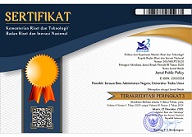Strengthening Regional Fiscal Capacity in the Era of Decentralization: Strategy for Local Revenue Optimization in North Bolaang Mongondow
Abstract
This study examines strategies for optimizing Local Revenue in North Bolaang Mongondow Regency within the framework of fiscal decentralization, emphasizing efforts to strengthen regional fiscal capacity. Employing an exploratory qualitative approach, the research integrates SWOT (Strengths, Weaknesses, Opportunities, Threats) analysis to explore institutional, managerial, and personnel factors influencing the performance of Local Revenue. Data were gathered through literature review, participant observation, and in-depth interviews with key stakeholders. The findings reveal three major constraints: (1) low public awareness and compliance related to taxation and retribution systems, (2) inadequate transparency and service quality in Local Revenue management, and (3) limited competencies of government personnel in tax regulation enforcement. The study proposes three strategic approaches: market penetration through tourism and creative industry development, market development via support for micro, small, and medium enterprises and cross-sector collaboration, and product development through digital transformation of tax services and civil servant training. The results highlight the importance of institutional reform, accountable governance, and investment in human capital as integrated pathways to improve Local Revenue. Although limited in geographical and methodological scope, the study provides relevant insights for policy refinement. Future research is recommended to employ mixed methods and cross-regional comparisons to deepen understanding of the dynamics between Local Revenue management and regional fiscal independence.
Keywords
Full Text:
PDFReferences
Akhmadi, M. H., & Rachmalia, A. O. (2021). Dampak Pandemi Covid-19 Terhadap Pengelolaan Kas Bendahara Penerimaan Pemerintah Daerah. JIAP (Jurnal Ilmu Administrasi Publik), 9(2), 113-125
Ambarwati, R. B., & Waluyo, W. (2020). Pelaksanaan Pemungutan Retribusi Terminal di Kabupaten Sukoharjo. Jurnal Discretie, 1(1), 9-15.
Bellofatto, A. A., & Besfamille, M. (2018). Regional state capacity and the optimal degree of fiscal decentralization. Journal of Public Economics, 159, 225-243.
Burriel, P., Chronis, P., Freier, M., Hauptmeier, S., Reiss, L., Stegarescu, D., & Van Parys, S. (2020). A fiscal capacity for the euro area: Lessons from existing fiscal-federal systems. Banco de España Occasional Paper, (2009).
Borrás, S. (2003). The innovation policy of the European Union: from government to governance. Edward Elgar Publishing.
Cayer, J. (2009). Human resource management lessons from past fiscal crises. Navigating the Fiscal Crisis: Tested Strategies for Local Leaders.
Christia, A. M., & Ispriyarso, B. (2019). Desentralisasi fiskal dan otonomi daerah di Indonesia. Law Reform, 15(1), 149-163.
Cornia, G. C., & Nelson, R. D. (2010). State tax revenue growth and volatility. Federal Reserve Bank of St. Louis Regional Economic Development, 6(1), 23-58.
David, M. E., David, F. R., & David, F. R. (2017). The quantitative strategic planning matrix: a new marketing tool. Journal of strategic Marketing, 25(4), 342-352.
David, F. R., & David, F. R. (2017). Strategic management: concepts and cases: A competitive advantage approach. Pearson.
Febianti, F. (2019). Partisipasi Masyarakat dalam Pembayaran Pajak Bumi dan Bangunan Perdesaan dan Perkotaan (PBB-P2) di Kecamatan Sumedang Selatan. JRPA-Journal of Regional Public Administration, 4(2), 41-51.
Hastuti, P. (2018). Desentralisasi fiskal dan stabilitas politik dalam kerangka pelaksanaan otonomi daerah di indonesia. Simposium Nasional Keuangan Negara: Kementerian Keuangan Ri Tahun 2018, 784-799.
Irawan, E. (2023). Peran Kebijakan Fiskal Dalam Perekonomian: Suatu Kajian Literatur. Jurnal Riset Rumpun Ilmu Ekonomi, 2(2), 01-08.
Jatmiko, B., Udin, U. D. I. N., Raharti, R., Laras, T., & Ardhi, K. F. (2021). Strategies for MSMEs to achieve sustainable competitive advantage: The SWOT analysis method. The Journal of Asian Finance, Economics and Business, 8(3), 505-515
Jogiyanto Ramdhan, M. (2021). Metode penelitian. Cipta Media Nusantara.
Jan, T. S. (2022). PENGADILAN PAJAK: Upaya Kepastian Hukum dan Keadilan bagi Wajib Pajak. Edisi ke II Tahun 2022. Penerbit Alumni
Khusaini, M. (2018). Keuangan daerah. Universitas Brawijaya Press.
Labolo, M. (2017). Menutup celah korupsi pemerintahan daerah. Jurnal Ilmu Pemerintahan Widya Praja, 43(2), 93-110.
Lewis, B. D. (2017). Local government spending and service delivery in Indonesia: the perverse effects of substantial fiscal resources. Regional Studies, 51(11), 1695-1707.
Mosteanu, N. R., & Mitroi, M. (2015). European Tax Models. Economics World, 3(1-2), 18-30.
Nursafitra M, N. M. (2019). Strategi Peningkatan Pendapatan Asli Daerah (Pad) Melalui Intensifikasi Dan Ekstensifikasi Penerimaan Pajak Daerah Dan Retribusi Daerah Di Kabupaten Enrekang (Doctoral Dissertation, Universitas Hasanuddin).
Nurokhman, H. (2016). Analisis Penggalian Potensi Pajak atas Transaksi E-Commerce Melalui Intensifikasi Perpajakan (Doctoral dissertation, Politeknik Keuangan Negara Stan).
Pohan, C. A. (2021). Kebijakan dan administrasi perpajakan daerah di Indonesia. Gramedia Pustaka Utama.
Sandiata, V., Aryesam, P., & Pailah, S. Y. (2023). Peran Pemerintah Daerah Untuk Mewujudkan Asas Transparansi Dalam Penggunaan Anggaran Pendapatan Belanja Daerah (Doctoral Dissertation, Universitas Katolik De La Salle Manado).
Salim, M. A., & Siswanto, A. B. (2019). Analisis SWOT dengan Metode kuesioner. CV. Pilar Nusantara.
Sunarso, H. S., & SH, M. (2023). Hukum pemerintahan daerah di Indonesia. Sinar Grafika.
Suryani, S., & Ramadhan, S. (2017). Analisis literasi keuangan pada pelaku usaha mikro di kota pekanbaru. Journal of Economic, Bussines and Accounting (COSTING), 1(1), 12-22.
Silalahi, U. (2018). Metodologi analisis data dan interpretasi hasil untuk penelitian sosial kuantitatif.
Tohopi, R., Nani, Y. N., & Aneta, Y. (2021). Model Perumusan Kebijakan “Public Mechanism Approach” Perencanaan Pembangunan Daerah di Kabupaten Gorontalo. Sawala: Jurnal Administrasi Negara, 9(2), 141-154.
Thompson, P. N. (2017). Effects of fiscal stress labels on municipal government finances, housing prices, and the quality of public services: Evidence from Ohio. Regional Science and Urban Economics, 64, 98-116.
Weiss, D. C. (2008). The Foreign Corrupt Practices Act, SEC disgorgement of profits, and the evolving international bribery regime: Weighing proportionality, retribution, and deterrence. Mich. J. Int'l L., 30, 471.
DOI: https://doi.org/10.35308/jpp.v11i2.11397
Refbacks
- There are currently no refbacks.
Copyright (c) 2025 Sirajudin Lasena, Asna Aneta, Yanti Aneta, Ismet Sulila, Abdul Wahab Podungge
p-ISSN: 2477-5738 I e-ISSN: 2502-0528 I DOI: 10.35308
Jl. Alue Peunyareng, Ujong Tanoh Darat, Meureubo, Kabupaten Aceh Barat, Aceh 23681, Indonesia
(0655) 7110535 l +621260313742 l +6285277110911
 is licensed under a Creative Commons Attribution-ShareAlike 4.0 International License
is licensed under a Creative Commons Attribution-ShareAlike 4.0 International License


